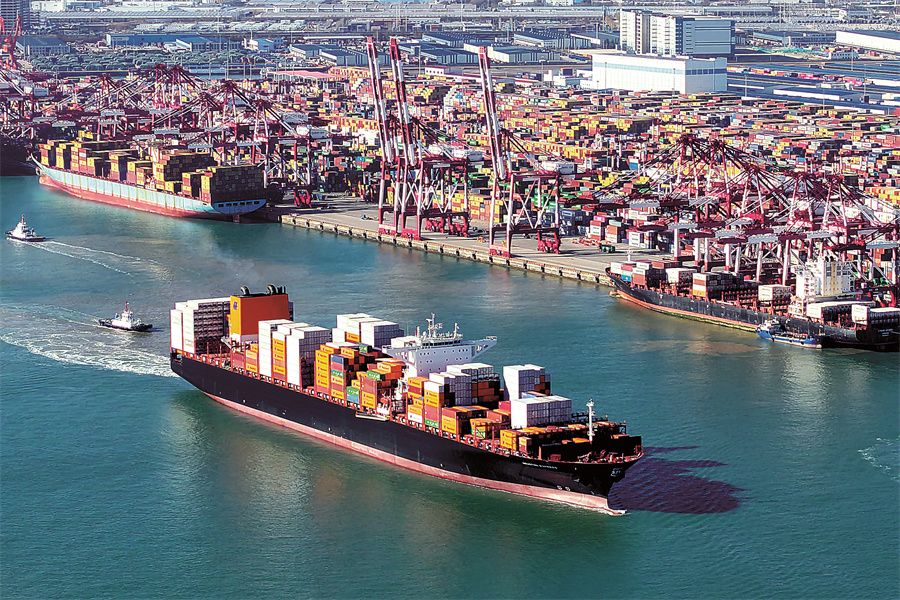
container ship leaves Qingdao Port, Shandong province. [YU FANGPING/FOR CHINA DAILY]
The United States' new tariff push is likely to backfire by accelerating the de-dollarization trend and potentially prompting sell-offs of US Treasuries by major foreign debt holders, leading economists and currency experts said.
"With the abuse of tariff measures, the US is changing itself from a 'maker and defender' of international rules to a 'destroyer and coercer'," Zhao Zhongxiu, president of the University of International Business and Economics in Beijing, said in an exclusive interview with China Daily.
The US' "reciprocal tariffs", which were announced on Wednesday and include a 10 percent "minimum baseline tariff" and higher rates on certain trading partners, are expected to deal a heavy blow to the multilateral trade system and global commercial practices, while leading to greater economic isolation of the US, Zhao said.
All of this will erode US credibility, further dampen the world's confidence in the dollar and push more countries to settle trade in alternative currencies, said Zhao, a professor of international economics.
Furthermore, some trade partners of the US may see reduced dollar income as exports to the US drop, and they may have to sell US Treasuries to obtain the dollar liquidity needed for international payments, Zhao said.
For China, selling US Treasuries could even be considered a possible countermeasure, if necessary, he added.
As of the end of January, foreign holdings of US Treasury securities stood at $8.53 trillion, with Japan and China being the top two holders at $1.08 trillion and $760.8 billion, respectively, according to the US Department of the Treasury.
The Chinese government will continue to take resolute measures to safeguard its sovereignty, security and development interests, according to a statement released by Xinhua News Agency on Saturday on China's position on opposing US abuse of tariffs.
"We don't make trouble, but we have no fear of trouble," the statement said, adding that the US tariff push is sacrificing the legitimate interests of countries worldwide to serve the US' own hegemonic agenda.
As severe turbulence is set to unfold in global trade, the UIBE president said that China's commitment to fostering a more open, stable market environment and creating more opportunities for mutual benefit will be crucial in avoiding a drastic global economic recession.
Following the US tariff announcement, Stephane Dujarric, spokesman for the secretary-general of the United Nations, expressed concern over the "rise in economic protectionism" and its impact on the global economy.
Guan Tao, global chief economist at investment bank BOCI China, told China Daily that the "reciprocal tariffs" may increase the risk of a deep global recession, drawing parallels to the 1930 Smoot-Hawley Tariff Act, which triggered retaliatory measures, collapsed global trade and deepened the Great Depression.
The recession fears have affected the greenback, as anticipation of US interest rate cuts to counter slower growth weakened the US dollar index, which gauges the greenback's value relative to a basket of currencies, to 102.85 as of Friday's close, down 5.13 percent since the beginning of the year, according to market tracker Wind Info.
In the long run, the US' "reciprocal tariffs" are bound to undermine its own currency's global role, said Guan, who is also former head of the Balance of Payments Department at the State Administration of Foreign Exchange.
"To supply global dollar liquidity, the US must run trade deficits. As Washington seeks to reduce deficits through tariffs, global dollar liquidity will tighten, weakening the dollar's international standing," Guan said.
Jeffrey Sachs, director of the Center for Sustainable Development at Columbia University, called for Washington to aim for a world in which prosperity is widely shared, rather than one in which only the US thrives while others remain poor.
Chen Wenling, former chief economist at the China Center for International Economic Exchanges, said that China's vast economic scale will serve as a strong buffer against external pressures, especially as the country prioritizes domestic demand to build a more stable growth model that is less exposed to global trade volatility.
编辑:韩睿